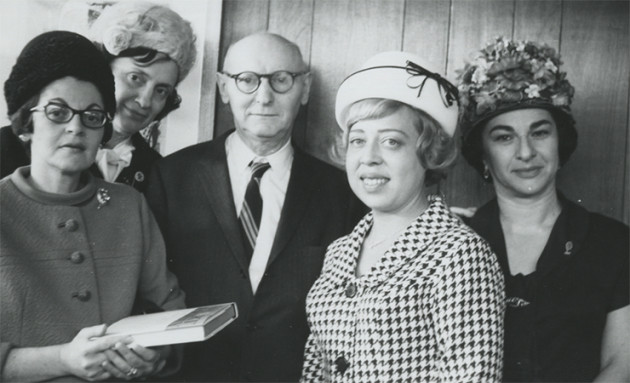
by Amy Stone
New York Jewish Film Festival Opener: “The Muses of Isaac Bashevis Singer”
 The ghost of Isaac Bashevis Singer got lucky. Two Israeli filmmakers—male – have handed the master of Yiddish tales a posthumous grand slam. He gets the first word and the last cinematic image on his definition of paradise—a harem of translators, all women.
The ghost of Isaac Bashevis Singer got lucky. Two Israeli filmmakers—male – have handed the master of Yiddish tales a posthumous grand slam. He gets the first word and the last cinematic image on his definition of paradise—a harem of translators, all women.
The U.S. premiere of “The Muses of Isaac Bashevis Singer,” the 2014 English-Yiddish-Hebrew documentary directed by Asaf Galay and Shaul Betser, opened the 24th New York Jewish Film Festival on January 14th.
Aside from his first and most famous translator, Saul Bellow (he translated “Gimpel the Fool”), and Singer’s son, seemingly all his dozens of translators were harem material.
We see footage of Singer surrounded by a bevy of young beauties asking him questions like, “Why do you write in Yiddish?” “Because I dream in Yiddish, and you should always write in the language you dream in.”
The 72-minute film brings together a seemingly endless parade of Singer’s translators. It’s a lighthearted journey to honky tonk piano and silent-movie-style scene cards in Yiddish and English.
Few of the women interviewed fault him for his sexual advances, though one, Evelyn Torton Beck, says, “I think I’m very, very lucky he never put the make on me.” (Read what she wrote for Lilith about his misogyny here.) Another translator says, “He slept with all his translators. Except me.” Could the tales of Singer’s irresistible charm have been a bit apocryphal?
Some of the women are unwittingly hilarious. Plenty are vain, lamenting their lost beauty. (Photos document their earlier charms.) Not all the “translators” spoke Yiddish. Singer would read his work to them in his own translations, and they would improve it.
He doesn’t seem to have ever credited his translators for his success, and his muses remained unsung. But without the English translations, Singer, who wrote only in Yiddish, would probably not have received the 1978 Nobel Prize for Literature.
Singer arrived in the U.S. from Warsaw in 1935 with $50 and the manuscript of his novel. He left a wife and son in Poland and never looked back. Decades later, his son finally came to New York to meet him. We see shots of father (diminutive) and only child (hulky kibbutznik) on the sidewalks of New York. His son wanted a father. What he got was some translation jobs.
Alma Singer – the woman who got and more-or-less kept Singer, left a husband and three young children for him. Once married, Singer continued to cultivate his harem of translators, and Alma, ever perfectly groomed, was, according to her niece, “very, very jealous, and she was right.” In fact, a surprise revelation near the film’s end, she was also one of Singer’s translators.
Somehow the little man, in dark hat and jacket, white shirt, vulnerable in his complete baldness and apprehensive blue eyes, continued to charm, shamelessly. He happily enhances his reputation, saying “‘Thou shalt not commit adultery’ is one commandment that needs a little correction.”
His last translator, Duba Leibell, working with him in Miami, describes Singer as a decrepit but very frisky old man. We see him bedridden but still impeccably dressed in a white shirt. To get him going on a short story, Leibell would make up little porno scenes: “Isaac Bashevis Singer gets into the elevator with a redhead and he fucks her.” Singer would insist that more character development was needed.
The last scene is truly Singer’s earthly paradise. In Sweden, he is addressing an audience of 1,200 Swedish librarians, all women. He looks out on this sea of women, shelves his plan to read from his work, and spends an hour and a half talking about how books and librarians saved his life and about his love of writing. They wouldn’t let him go. Maybe Singer added a room in paradise for a thousand Swedish librarians.
So there you have it – one Polish-Jewish-American man’s image of paradise brought to us by two Israeli men.
What’s missing emerged from the post–screening Q&A with the two directors. Festival director Aviva Weintraub of the Jewish Museum made the point that the translations of Singer’s works were not verbatim. The women were also creating. Among the translators, were there any who hated him? According to the directors, no, they all loved him.
A blonde in a red sweater in the audience tells otherwise. She was the one in the early film clip who asks Singer, “Why do you write in Yiddish?” From her description, it sounds like Singer used her like a convenience stop. He’d plop himself down at her place, which was near his publisher, Farrar Straus Giroux, and he sent her up to his apartment on the Upper West Side to see if Alma looked good before an event. (Of course she did.)
He disappeared on his first wife and son. He probably pulled a vanishing act on his translators, but the film doesn’t go there. In paradise, no answers are needed.
The Jewish Museum and Film Society of Lincoln Center’s two-week multi-national extravaganza runs night and day through Jan. 29. Program online at www.nyjff.org. Do not hesitate—many films are already sold out.